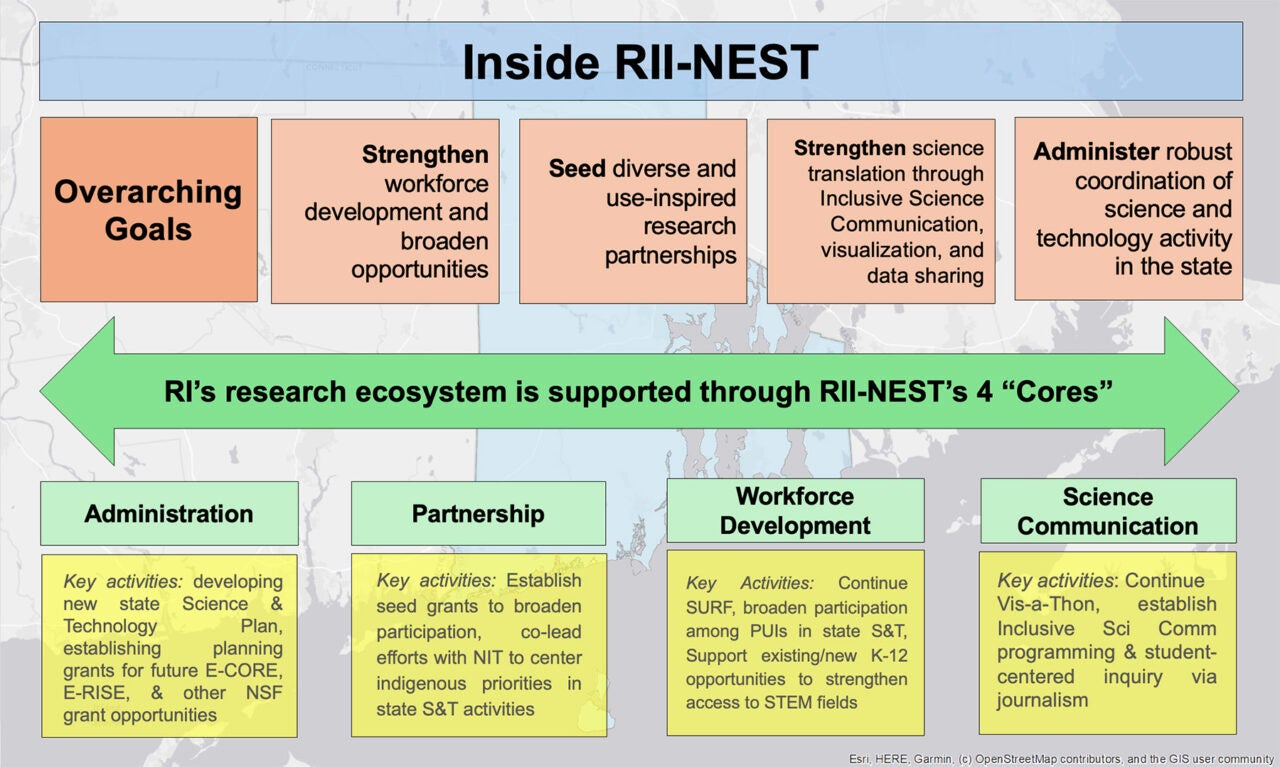The RI Network for Excellence in Science and Technology (RI-NEST) is a $8 million initiative over four years that will strengthen research infrastructure and capacity in RI, alongside the Narragansett Indian Tribe and its people, and position the state to develop use-inspired research as well as societal and economic growth into the future.
Vision
Thriving communities engaged with and benefiting from science and technology endeavors across Rhode Island and the Narragansett Indian Tribal Nation.
Mission
Enable the State of RI and the Narragansett Tribe and their people to grow and sustain research infrastructure that provides social and economic benefit to all and is founded on use-inspired science and technology, science communications, and workforce development opportunities.

Infrastructure “Cores” – RI-NEST’s focus areas
Administration: A well-functioning administrative core will ensure RI-NEST is executed cost-effectively, with work completed on-time, and on-target. The administrative core will manage RI-NEST internal operations and communications, collaborate with the Jurisdictional Steering Committee (JSC), which is a committee of the Rhode Island Science and Technology Advisory Council, and assist in the development of the statewide RI EPSCoR office.
Partnership: RI has a unique advantage as its research, educational and training facilities, and related programming, are all in close geographical proximity. Such advantage, however, has not been maximized due to a lack of coordination within the networks of institutions, industries, and community partners and between those networks. Becoming a Blue Economy leader and growing key RI industries that will employ and retain talent in the jurisdiction will require a stronger connection between science, communities and entrepreneurship. RI-NEST will build upon existing partnership platforms to facilitate critical dialogues that build trust, develop innovations, and link to financial sustainability.
Workforce Development: Rhode Island’s Blue Economy must increase access to well-paying jobs and targeted skills training for a broad spectrum of communities and individuals across the state. In response, the workforce development core has three goals: 1. Develop and maintain robust programming for undergraduates, including those at Primarily Undergraduate Institutions (PUIs), to engage in use-inspired research and other activities that boost the state’s research competitiveness. 2. Broaden pathways for pre-undergraduates to enter STEAM fields. 3. Strengthen professional skills among undergraduates, graduate students, and early career professionals, promoting success in extramural research funding and employment by providing competencies beyond technical skills in areas such as transdisciplinary research, entrepreneurship, intellectual property management and science communication.
Science Communication: Science communications promote effective engagement with partners on research goals, activities, and findings, yet requires audience-specific conversations around topics rather than just dissemination of facts. This core augments existing capacity in art, design and science communication to broaden opportunities to engage and foster unique, transdisciplinary collaborations. Science communications is a necessary competency to advance discovery and innovation “in service to society” and make STEAM-related research, data, and technology accessible, relevant to and inclusive of a diverse and dynamic world of humans.
Want to learn more, join our community and offer your unique perspective on RI-NEST?

 RI NSF EPSCoR is supported in part by the U.S. National Science Foundation under EPSCoR Cooperative Agreements #OIA-2433276 and in part by the RI Commerce Corporation via the Science and Technology Advisory Committee [STAC]. Any opinions, findings, conclusions, or recommendations expressed in this material are those of the author(s) and do not necessarily reflect the views of the U.S. National Science Foundation, the RI Commerce Corporation, STAC, our partners or our collaborators.
RI NSF EPSCoR is supported in part by the U.S. National Science Foundation under EPSCoR Cooperative Agreements #OIA-2433276 and in part by the RI Commerce Corporation via the Science and Technology Advisory Committee [STAC]. Any opinions, findings, conclusions, or recommendations expressed in this material are those of the author(s) and do not necessarily reflect the views of the U.S. National Science Foundation, the RI Commerce Corporation, STAC, our partners or our collaborators.